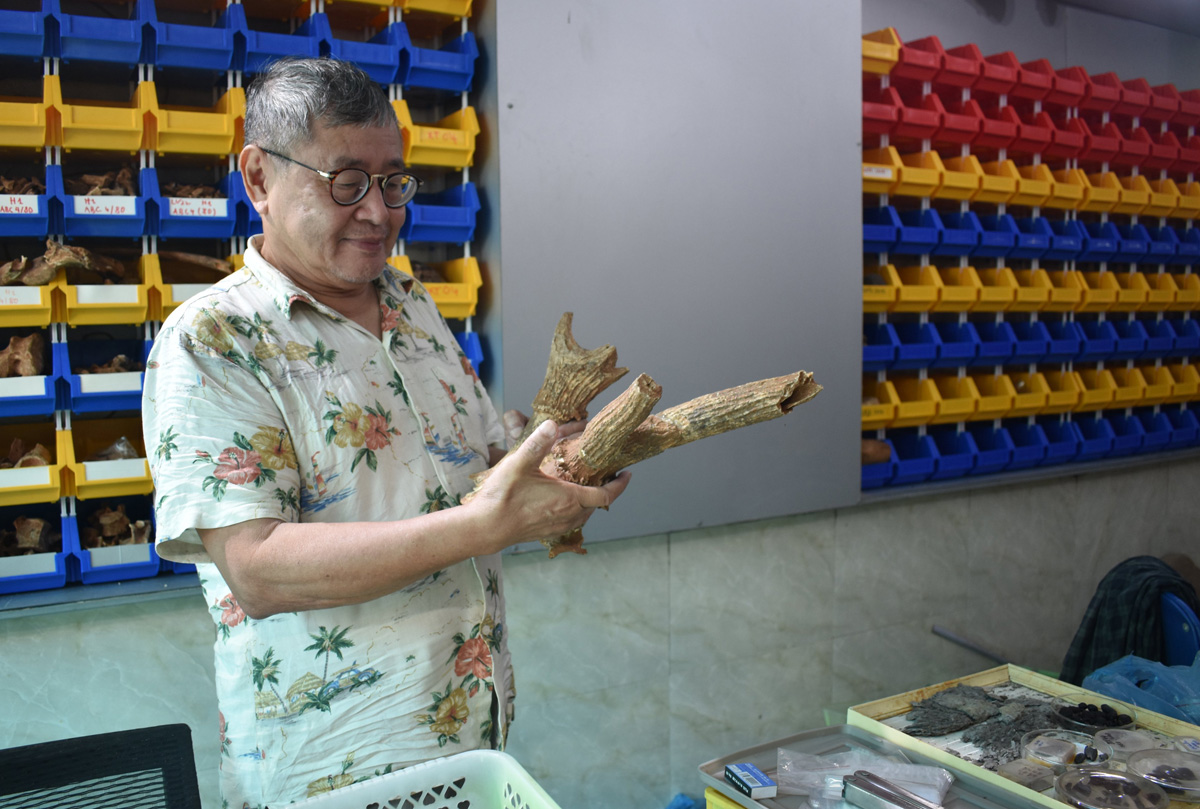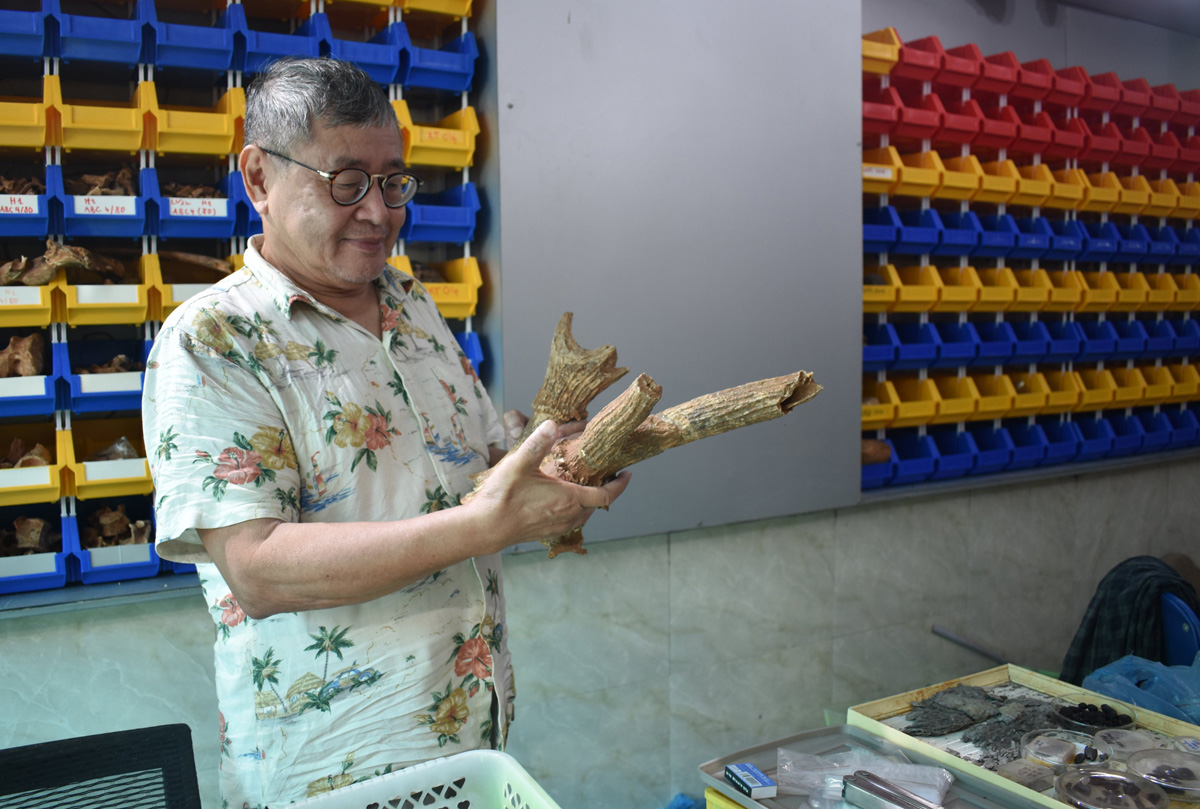
(HBO) – The Hoa Binh Civilisation is a renowned prehistoric one in Vietnam and Southeast Asia. Its relic sites have been discovered and studied in many periods in history by different teams and individuals.
Archaeologist Dr. Nguyen Viet are still
applying himself to the study of the Hoa Binh Civilisation.
The one who discovered and laid the foundation
for the research of the Hoa Binh Civilisation in the country was French
archaeologist Madeleine Colani. More than 20 studies of the civilisation by her
left a great imprint on archaeology in Vietnam and Indochina as a whole.
Following Colani’s findings, some Vietnamese and
international scientists continued studying this civilisation.
In the early 1960s, Prof. Dr. Boriscopski, a
Russian expert in the Old Stone Age from the Leningrad (Saint Peterburg) State
University of the then Soviet Union, came to Vietnam to help train the first
generation of the country’s archaeologists. He re-examined some caves that
Colani had discovered and excavated and also conducted excavations at Muoi and
Tam caves.
In the late 1960s and early 1970s, Dr. Chester
Gorman from the US carried out a research on the Hoa Binh Civilisation in
Southeast Asia. He was the first person to use screening to shed light on plant
traces of the civilisation and formulate a hypothesis about the practice of
agriculture in the Hoa Binh Civilisation. Gorman visited Vietnam and caves in
Hoa Binh from 1978.
A Japanese archaeologist who also greatly
contributed to the civilisation study was Nishimura Manasary, who had taken
part in some excavations in Thailand and then came to Vietnam in the 1990s to
research Trai Hamlet Cave. His findings were publicised at a conference marking
the 60th anniversary of the civilisation recognition in Hanoi in 1992.
Among Vietnamese archaeologists, the researchers
dedicating to the study include Assoc. Prof. Hoang Xuan Chinh, an expert in the
Stone Age and former Deputy Director of the Vietnam Institute of Archaeology.
He excavated some caves and published some articles and books about the Hoa
Binh Civilisation.
Another is Dr. Nguyen Viet, Director of the
Centre for Prehistoric Southeast Asian Studies, who was the first person to
apply screening and micro archaeological documentation to archaeological
studies in Vietnam in 1982, 1986 and 1987, regarding such caves as Trai Hamlet,
Vanh Village, Tre Hamlet, Muoi, Con Moong, Cang, and Sung Sam.
Luu Huy Linh, Deputy Director of the provincial
Department of Culture, Sports and Tourism, said aside from the abovementioned
scientists, others from many countries such asNepal, India, Thailand,
Malaysia, Indonesia, Japan, and China have also studied the Hoa Binh
Civilisation.
After nearly one century of research, the Hoa
Binh Civilisation has always been a unique prehistoric civilisation attractive
to generations of archaeologists. Amid the science development nowadays, the
study of the civilisation promises many more mysteries to be revealed, he
added./.
With an increasingly vibrant and widespread emulation movement aimed at building cultured residential areas and cultured families, Yen Thuy District has been making steady progress toward improving both the material and spiritual well-being of its people, while fostering a civilized, prosperous, beautiful, and progressive community.
Once lacking recreational spaces and community facilities, Residential Group 2 in Quynh Lam Ward (Hoa Binh City) has recently received attention for the construction of a new, spacious, and fully equipped cultural house. The project followed the model of state support combined with public contributions in both labor and funding.
The "All people unite to build cultural life" movement, which has been effectively integrated with Kim Boi district’s socio-economic development goals, is fostering a lively spirit of emulation across local residential areas, hamlets, villages, public agencies, and enterprises. In addition, through the initiative, traditional cultural values are being preserved and promoted, while community solidarity and mutual support in poverty reduction and economic development are being strengthened.
A working delegation of the Hoa Binh provincial People’s Committee led by its Permanent Vice Chairman Nguyen Van Toan on June 11 inspected the progress of a project to build the Mo Muong Cultural Heritage Conservation Space linked to tourism services in Hop Phong commune, Cao Phong district.
Born and growing in the heroic land of Muong Dong, Dinh Thi Kieu Dung, a resident in Bo town of Kim Boi district, in her childhood was nurtured by the sweet lullabies of her grandmother and mother. These melodies deeply imprinted on her soul, becoming an inseparable part of her love for her ethnic group's culture. For over 20 years, this love for her hometown has driven Dung to research, collect, and pass down the cultural values of the Muong people to future generations.
In the final days of May, the Ethnic Art Troupe of Hoa Binh Province organized performances to serve the people in remote, mountainous, and particularly disadvantaged areas within the province. These were not just ordinary artistic shows, but they were the meaningful journeys aimed at spreading cultural values, enhancing the spiritual life of the people and contributing to the preservation of ethnic minority cultural identities.



